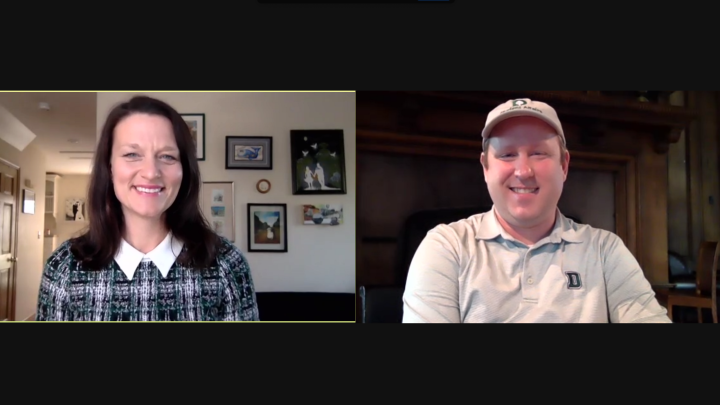Talk of Covid-19 vaccines and testing topped the new year’s first Community Conversation, which had been delayed a day following the Jan. 6 storming of the U.S. Capitol.
But before getting to the Dartmouth specifics, Provost Joseph Helble, who, prior to arriving at Dartmouth in 2005, spent a year working at the Capitol as an aide to former Sen. Joseph Lieberman (D-Conn.), had a few words about the Washington, D. C. mob attack.
“I walked those halls. I stood in the small staff section at the back of the Senate chamber, listening to spirited debates,” Helble said. “And I never for a moment forgot the privilege of being in that place, with that history, working for an institution devoted to ideals of democracy and freedom.” To see it desecrated and overrun drove home the importance of Dartmouth’s commitment to academic freedom, the freedom to dissent, and critical thinking, he said.
“We know that speaking of testing and research and art and skating on the Green may seem insignificant in comparison, but this is core to nurturing and supporting students—supporting a free, inquiring, and intellectual community. It is our work, our mission, and what we need now. It is what we are here to discuss today,” he said.
To continue supporting the Dartmouth community during the pandemic at the start of winter term—remote classes for undergraduates and some graduate students began today—Helble urged students, faculty, and staff to continue to follow public health guidelines. Positive virus cases in Grafton County are now 10 times higher than they were in October.
Classes will be remote for all undergraduates until Jan. 18, when half of the students are scheduled to return to campus. Some classes will move to in-person sessions, but most will continue to be remote. Classes for graduate and professional school students operate on a different schedule and are a mix of remote and in-person learning.
“If the disease begins to accelerate and we find that we are getting increasing caseloads that reach the point where they are difficult to manage, we are going to have to very carefully assess our plans,” Helble said.
Webcast guest Lisa Adams, an epidemiologist and co-chair of Dartmouth’s COVID-19 Task Force, said that according to current New Hampshire and Vermont state vaccination procedures—which prioritize people based mostly on age, with older residents going first—it’s likely that vaccinations will continue through the summer.
Given the lengthy rollout, Helble said the upcoming spring term probably won’t see a return to regular campus operations, with all students on campus for in-person classes. “We all recognize that spring will not be a return to normalcy, much as we wish it were so,” he said. Vaccines will not be administered by Dartmouth, he said, and encouraged people to contact their health care providers and stay informed about state protocols.
Adams, an associate professor of medicine at the Geisel School of Medicine, said that even after receiving vaccinations, people should continue to wear masks, practice physical distancing, and take other public health precautions.
“It’s important for us to be staying the course, with all of our preventive measures,” she said.
Guests Caitlin Barthelmes, director of the Student Wellness Center, and Eric Ramsey, associate dean for student life and director of the Collis Center for Student Involvement, talked about wellness offerings and winter activities that are in the works.
“We have focused on expanding accessibility by reimagining our services and have yielded some creative ways to reach students no matter where they are,” said Barthelmes. She said that with so many students learning remotely, her department’s website has been functioning as a virtual wellness center. One upcoming activity, a 15-day mindfulness challenge, will encourage students to learn about ways to stay well while they are in quarantine upon returning to campus. The center offers mindfulness and yoga activities, wellbeing tips, and drop-in sessions.
Ramsey said many of the new activities that are being created to encourage students be active and enjoy winter are the result of student suggestions. He urged community members to continue to propose ideas—for activities indoors and out—and send them to WinterTermSuggestions2021@Dartmouth.edu. “There’s a whole team of people that are very interested in making sure that Dartmouth is at its best for this winter.”
Upcoming opportunities include the installation of ice skating rinks on the Green, a dozen outdoor gas firepits being set up across campus, sleds and snow tubes available for student use, plans to groom cross-country trails for skiing on the former country club property, and skiing at the Dartmouth Skiway.
Also mentioned on the webcast:
- Scholarly research has increased by more than 40% this year over last year for the six month-period from April to September. Helble called it a “testament to how our faculty and research staff utilized the time they could not access the campus to focus on developing their ideas for research funding to support future activity.”
- COVID-19 testing will increase from one to two times a week for students and employees who work on campus. Beginning Jan. 25, testing will move from Leverone Field House to Thompson Arena to make Leverone available for athletics. Advance Transit runs will be added to the Dartmouth downtown shuttle route, which stops at Thompson.
- The Hood Museum of Art has created “tiny tours” and “tiny visits,” in-person activities for enrolled students with approval to be on campus, that offer opportunities to explore gallery installations.
Community Conversations is a live production of Dartmouth’s Media Production Group and the Office of Communications that airs on selected Wednesdays at 3:30 p.m. The next webcast will deviate from the regular schedule and will be held on Jan. 21.
For the most recent information on Dartmouth’s response to the pandemic, visit the Dartmouth Together COVID-19 website.
William Platt can be reached at william.c.platt@dartmouth.edu.


